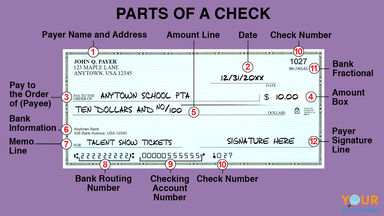
Carousel Checks
Personal check vs cashier’s check
What Is a Personal Check?
Personal checks are small pieces of paper that your bank issues which include the routing number of the bank along with your account number. Checks are written orders that require a bank or financial institution to transfer a particular amount out of the check’s account to the payee, the person or company listed by the cheque. Sometimes, a check might not specify a particular person or business, so anyone who presents the check for payment can get the money.
Many checking accounts with traditional brick-and-mortar banks allow you to purchase personal checks you may pay with. Some checking accounts even provide check-writing services for account holders at no cost.
Personal checks are recommended to be protected inside the checkbook covers since they are really small and thin pieces of paper that are valuable.
How to Write a Personal Check
Even though checks are decreasing in value as a method of payment in many situations that require payment via personal checks. Here are some points to keep in mind if you are called upon to write a traditional paper check.
- Write with black or blue ink.
- Note the current date in the line for a date in the format of the month-day-year.
- Include the name of the person who is paying next to “Pay to the order of.”
- Write the numeric value of the check into the box and mark it with the dollar sign (e.g., “19.99).
- Indicate the value for the “Dollar amount” line, with cents being expressed as fractions (e.g., “Nineteen dollars and 99/100”).
- Signature: Sign your name in the “Signature” line “Signature” line.
- Include a note to the payee’s “Memo” line in the lower left.
Where Can I Cash a Personal Check?
If you’ve got personal checks that you would like to exchange for cash immediately the best place to choose is a branch managed by the bank named in the document.
If the check is written through one of the bank’s account holders and the account has enough funds to pay for the check. If you are the person named as the payee on the check, the financial institution may make the payment on the spot. However, you may be charged a fee even if you don’t have a bank account at the bank.
You can also visit your local bank to deposit an individual check, but you may not be able to cash checks worth more than $200. Some supermarkets and retail chains including Walmart offer to check cashing options, but be prepared for steep fees if you choose this route. If you don’t need the cash right away, deposit the check into your account and it’ll clear within 3 to 5 business days.
What Is a Cashier’s Check?
Cashier’s checks are check that is drawn from the bank’s money, not the individual account holder’s. It’s a method of payment that guarantees the recipient there is enough cash to pay the cost of the check. The person who wants the cashier’s cheque must first give the bank enough money to pay for the value of the check.
Cashier’s checks offer payees the benefits of being paid reliably and immediately. This is why they’re often used in major transactions for purchases like a vehicle or the purchase of home.
How to Get a Cashier’s Check
The only way to obtain cashier’s checks is to go through a bank or credit union you are required to be a customer to receive one. Certain online banks allow you to order a cashier’s check from your laptop or smartphone however traditional banks might require you to visit branches. If you’re visiting in person, here’s the general process:
- Make sure you take the cash to pay the cashier’s check to your bank or credit union or have enough money in your account.
- Bring a photo ID from the government along with all the details needed for filling out the check, including the payee’s name.
- When you’ve supplied the money along with the name of the person who is paying The bank will then print the check.
- Look over the details of your check, and keep the receipt so that you know when it’s due.
Certain banks charge a fee of up to 15 dollars for a cashier’s check. Some banks offer cashier’s checks as a complimentary service for customers with a checking account.

